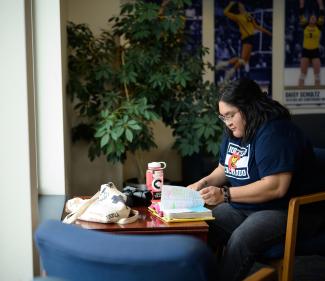Understanding Rest – More Than Just Relaxing

Over Christmas break, I was lazy. I didn’t do anything except watch B-level Christmas movies with my parents, work out a little, and read. It was nice … until it wasn’t.
I’d just gotten done with a really hectic month of hosting Christmas parties, coordinating schedules, and all the other things my job entails, and I thought a downshift into relaxation mode was exactly what I needed. But I got bored. Really fast.
It didn’t make sense. Isn’t a lazy week away from everything one of the highest forms of bliss imaginable? Soon enough, it was time to get back to regular life, and whatever small sense of being “rested” melted faster than Frosty the Snowman in Death Valley.
It was then that I began to wonder: what if resting is more than just not doing anything, more than just vegging out on the couch or scrolling through all the socials?
The Rush
Before we can talk about what rest really is, we need to address why we need it.
If you’re a student, think back to your last finals’ week. (If you’re not, recall a time you had some other herculean undertaking.) Think of all the stress, the late nights, the cramming. Even if you aced every last thing, how long would you be satisfied with that accomplishment?
Since before we could tie our shoes, we’ve been rushing after accomplishments, whether that’s making our parents proud that we can sing the alphabet song all by ourselves or trying to be the best on our soccer team. Once we reach our goal, we rush onto the next thing. If we celebrate the accomplishment at all, it doesn’t last long.
We’re just not satisfied. For most of us, our childhood trophies and accolades are glorified dust collectors now. But the mentality that motivated us to rush after those things–“If I could just make Varsity” or “If I could just get straight As”–is alive and well. The things we’re chasing now are just “bigger and better” (e.g., graduating summa cum laude or landing the next promotion at work) and will supposedly satisfy us where things in the past haven’t.
We’re not just rushing after accomplishments either. It could be rushing after fun, relationships, hobbies, pretty much anything.
Don’t get me wrong. God has prepared us for action, to pursue things, to partner with him (Eph 2:10), and enjoying fun and friendships and new experiences is not a bad thing. God’s the one who created those things after all! But pieces of paper, titles, applause, the approval of our earthly parents is not enough, will never be enough. We were made for more.
God made us and made us for him. In ways we can’t fully understand, we crave him. But we do everything we can to satisfy that craving with earthly things. This is why we’re tired. This is why we’re weary. And this is why we need true rest.
A Posture of Rest
Like with so many struggles we face in life, Jesus steps right into the center of our rest problem and offers a solution: himself. “Come to me, all you who are weary and burdened, and I will give you rest. Take my yoke upon you and learn from me, for I am gentle and humble in heart, and you will find rest for your souls” (Mt 11:28-29).
If we consider Jesus’ life as recorded in the Scriptures, we’ll see pretty quickly that not doing anything wasn’t part of his agenda. He was always on the go during his three years of ministry, always interrupted, always being pressed to heal someone or respond to someone’s critiques. The guy was so busy, he was catching up on his Zs in the middle of a thunderstorm!
So what did Jesus know about rest? How can he give us rest if he was always so busy? It’s because the rest that he offers isn’t so much a thing, like three hours of Netflix binging, but a posture.
Jesus did everything out of a posture of rest.
He knew who he was, God the Father’s beloved Son (Mt 3:17), and why he was here on earth: “to proclaim good news to the poor … freedom for the prisoners and recovery of sight for the blind” (Lk 4:18).
This freed him from rushing and chasing after things. He didn’t need the accolades from being a miracle worker; he already had the love and attention of his Father. That’s why he often told people he healed to keep it a secret. He knew his purpose and his mission and wouldn’t be bullied into fulfilling others’ expectations for him. He wasn’t so locked into achieving one thing, like healing one man’s dying daughter that he wasn’t present to the needs of a woman who had been suffering for twelve years (Lk 8).
Jesus lived a beautiful life, a perfectly balanced, restful life. Even as he worked and served and loved and healed, he wasn’t rushing. His heart was at rest. A rest that remained through long days and late nights, a rest that remained through scathing attacks and intense struggles.
Finding Rest for Ourselves
We can have this kind of rest too. Since we’re all in different places in our walks with Jesus, the best thing we can do is turn to him to figure out how. Just as Jesus frequently retreated to places of quiet and stillness to talk to the Father, we need to do the same. Community – intentional, deep, Spirit-led community – is wonderful, but we must learn to spend time on our own with Jesus.
So my only practical piece of guidance is this: get by yourself with Jesus. Sit and be still. Try to let go of all the things on your mind and just be present to him. Ask him to come, to show himself to you. Release the expectation that you’ll get some crazy, incredible word or image from him. Just sit and be still. Then ask him what needs to happen for you to experience his rest.
It could be that he’ll invite you to more closely study his life documented in the Gospels in the Bible, to read his story not like a textbook but like you were right there with him. Jesus might call you to change certain rhythms in your life. Maybe your life’s just too busy, too hectic to leave any margin for real rest or connecting with him. Changing our lifestyles can be so hard to do. But if we truly say we love Jesus – with all of who we are – our actions need to show that. And as we experience this posture of rest, we can model it for others, inviting them into a peace they’ve never known!
If you need more guidance on how to be with Jesus on your own, check out these other posts:







